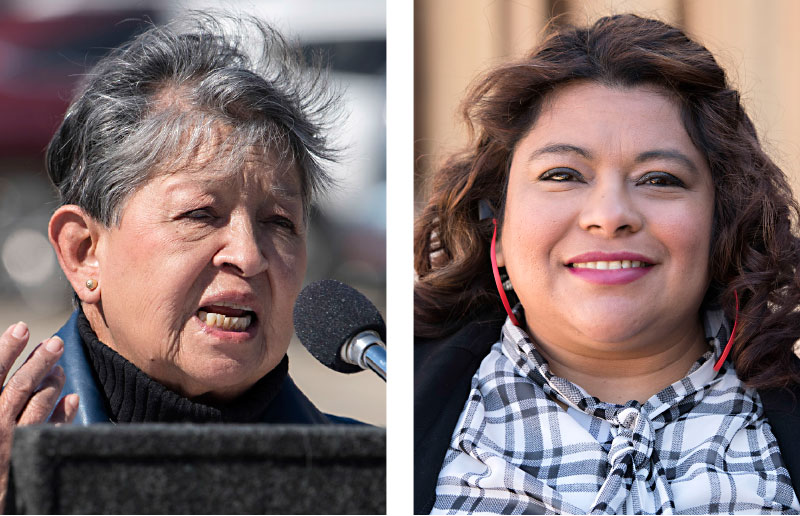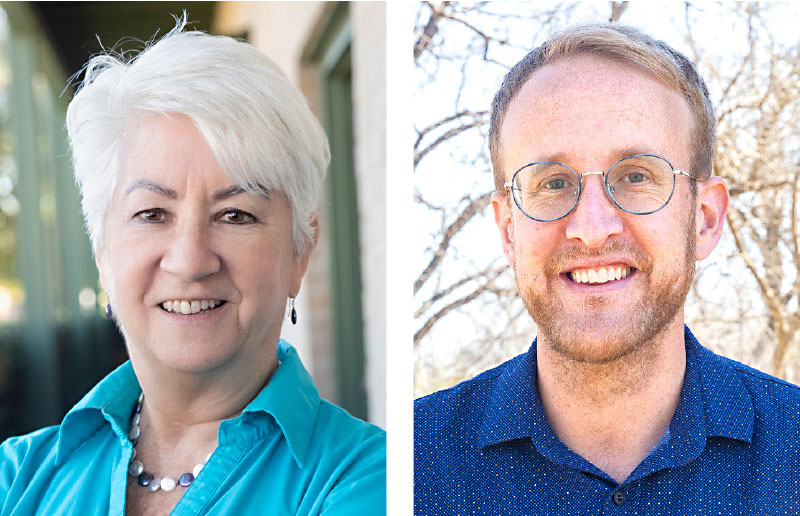Longtime Commissioners Face Challenges From Their Left
In the hot seats
By Lina Fisher, Fri., Feb. 18, 2022
In the races for Travis County Commissioners Court Precincts 2 and 4, two strong challengers face two incumbents with decades of experience. As they tussle over criminal justice reform, affordable housing, and infrastructure disparities, liberal stalwarts Margaret Gómez and Brigid Shea find themselves attacked from the left by community advocates with big plans for the county seat. The March 1 Democratic primary will decide the final outcome – there are no additional candidates who could force a May run-off, and no Republican has filed for either seat.
Precinct 4: The Boom Comes Knocking
Precinct 4 encompasses southeastern Travis County, including the county's poorest areas with the least amount of services – a disparity that Susanna Ledesma-Woody has flagged ever since her first challenge in 2018 to Margaret Gómez, the longest-serving member of the Commissioners Court, in office since 1995. (Should she be reelected, she'll become the longest-serving Travis commissioner in history, surpassing N.L. Gault's 26-year tenure, which ended in 1974.)
Ledesma-Woody has been active in Precinct 4 for more than a decade, having been a Del Valle ISD trustee since 2011. She founded the Del Valle Community Coalition in 2010, a nonprofit advocating for access to food and health care, with which the county has partnered on COVID relief and vaccine outreach. "Many parts of Precinct 4 are recognized as either food deserts or health care deserts; there's no excuse for this in one of the most progressive counties in the state," Ledesma-Woody says.
In order to build a health care "utopia," the precinct needs increased access to permanent clinics, says Ledesma-Woody, not just pop-ups like the massively successful Circuit of the Americas vaccination site: "We've been pushing for health care facilities for decades, and Central Health has been promising all this stuff. They were supposed to break ground [on the new permanent Austin Colony clinic] in December, and that still hasn't happened." Gómez also expresses disappointment in Central Health – "The whole purpose for creating the hospital district in the first place was to provide services to the underserved" – but says, "I don't know what else we can do to encourage them."
By running, Ledesma-Woody hopes to lend the court some teeth: "Commissioners appoint people to these boards [including Central Health], and they approve their budgets. I want to hold them accountable." She objects to Gómez's hands-off approach to issues within the city of Austin; Gómez says, "We deal with people out in the rural area; [cities] are responsible for their own upkeep, roads, law enforcement, and other services." But Ledesma-Woody counters that: "This is why we need forward-thinking active leaders in the community [who] collaborate with other entities like the city of Austin and Manor and Del Valle." Much of the latter area has been annexed by the city, beginning with the construction of Austin-Bergstrom International Airport in the late 1990s, but growth is continuing apace outside the city limits. "That's one of the things that really irks me when people talk about the county," Ledesma-Woody continues. "It's not just the unincorporated areas ... you're still accountable to all the people that are voting for you, that are paying taxes to you."
In regards to mobility, Ledesma-Woody wants to build off of the ongoing investment of an estimated $7.2 billion (of city taxpayers' money) in the Project Connect transit overhaul, which "doubled down on the north-south corridors," to initiate micromobility solutions like bike lanes and sidewalks in transit deserts, and to "get mass transit out to the Eastern Crescent before we have to retrofit everything." She plans to work with Council Member Vanessa Fuentes, who was involved with the Del Valle Community Coalition before being elected to represent Southeast Austin's District 2 in 2020, to implement grocery co-ops in the area while Del Valle waits for H-E-B or another grocer to build a supermarket there, something DVCC has been seeking for years.
On housing in the fast growing area, "I want to seek substantial investment in low-income housing by working with HACA [Housing Authority of the City of Austin] and partners that help people experiencing homelessness, by using federal relief funds, grants, or other financial means, and protect the community that's already here by investing in policies that reduce displacement and are easy to navigate."
Gómez touts the county's recent $110 million investment in homelessness solutions using American Rescue Plan Act funds, and says that looking to the future "the Del Valle area is in a transformational status right now," mostly due to the nearby Tesla "Gigafactory," which Gómez and Ledesma-Woody agree will result in its surrounding unincorporated areas' annexation. Gómez says this will lead to better infrastructure: "The reason there are no buses in Del Valle is [because] in 1985 when the mobility authority was created, Precinct 4 voted against it. [If] the city annexes, you get bus service. Some large changes are coming."
In this race as well as in Pct. 2, the incumbents have had to defend the court's decision to give $14 million in property tax rebates in 2020 to Tesla for its plant (Del Valle ISD also granted Tesla $50 million in incentives; Ledesma-Woody was the only trustee to vote no.) "We can't stop Tesla," says Gómez. "They're building roads, they're hiring people, they're attracting other businesses." Ledesma-Woody, on the other hand, is "not a fan of corporate incentives" and thinks the court "let Tesla get away with the basic requirements. A $15-an-hour [wage] is nothing in Austin and Travis County."
Precinct 2: Progressives, Then and Now
Bob Libal, the former director of Grassroots Leadership who is running against incumbent Brigid Shea in Precinct 2, has made the Tesla deal a major plank in his campaign platform. "Tesla was coming, regardless of whether we gave them tax breaks or not. They were really there to extract that public resource from us. And that's bad public policy. Frankly, Commissioner Shea from 10 years ago, when she was running for mayor, agrees with me." Shea, who served on City Council from 1993 to 1996, ran in 2012 against incumbent Mayor Lee Leffingwell; she won the county seat in 2014.
The current Shea justifies the decision saying that Tesla will bring jobs targeting those without a college degree and that "the previous landowner was a sand and gravel operation, [who] literally paid $640 a year [in taxes] to the county; Tesla's going to pay close to a million [dollars] or more each year. That money will go into diversion and prevention programs, social service programs, job training, all the kinds of things that we really do need to fund."
Libal's platform generally skews further left than Shea, though Shea has an impressive track record of liberal advocacy since she first made her mark on Austin politics by leading the campaign to pass the Save Our Springs Ordinance in 1992. On Council, she says, "I passed ethics and lobbying reform laws, the first domestic partner benefit law in Texas, the first wind energy project in Texas." As a county commissioner, she continues, "I've fought hard to create more than 11,000 units of deeply affordable housing – targeted to people earning 30-60% of area median income – and it's on the ground or being built."
Shea says she ran in 2014 for the Commissioners Court "because I didn't think our leaders were doing enough to fight climate change." To tackle the two largest contributors to greenhouse gas emissions in Austin – vehicle traffic and fuel for buildings – Shea touts a telecommuting program adopted by county staff, which has reduced county emissions by over 30%, and a switch to reclaimed wastewater for the chilled-air systems in county buildings. She is also working with Council Members Kathie Tovo and Alison Alter to implement resilience hubs to serve as warming and cooling centers during climate emergencies like last year's winter storm. "We aren't just talking about a Green New Deal. We're fully implementing it."
Libal agrees that the county needs a Green New Deal but points out the jail is the largest line item in the county budget. "If we're going to invest in a climate initiative, we can't continue to plow the same amount of money into the criminal justice system." Shea made enemies among justice advocates, including Libal, last summer with her positions on the planned $616 million rebuild and expansion of the Travis County Correctional Complex (also in Del Valle), including building a controversial women's jail.
During the public deliberations attending to that vote, and since, Shea has said Travis County doesn't have a mass incarceration problem, pointing to its successful programs that, even before COVID, had led to steady declines in its jail population. Similar claims were raised in 2020 by then-District Attorney Margaret Moore, who nonetheless lost her seat to José Garza on a wave of public support for justice reform.
"I think that Travis County needs a county commissioner who is steeped in criminal justice reform issues," says Libal. "Thirty-five percent of the incarcerated people in Travis County are Black in a community that's 9% Black, [and] almost 40% of people at the jail have a psychiatric diagnosis. It's the largest mental health provider in our community. With that $600 million, we could design a smaller jail, [and] we could invest in mental health and substance use facilities."
Shea supports diversion programs but says much jail funding is nonfungible and the county's hands are largely tied: "Counties must fund and maintain jails, sheriffs, and courts – that's mandated by the state constitution. We don't have much choice ... I believed staff and consultants when they said these jails are not appropriate for women; they don't have appropriate medical facilities on-site." Libal agrees that maintenance must be funded, "but if we're making a 50-year facilities plan, let's make sure it's based on current data."
Libal says the court should more broadly rethink its spending where public safety can be reimagined. For example, in response to increased traffic fatalities, the Commissioners Court approved Sheriff Sally Hernandez's request to convert correction officer positions at the jail into sheriff's deputies who could ramp up on-road traffic enforcement. Libal asks, "Do we have data that increasing law enforcement is going to reduce those traffic fatalities? Maybe [that requires] law enforcement on the highways, but maybe it's addressing five killer intersections," as the city has done with Vision Zero investments through the Austin Transportation Department. "And the second piece, which wasn't mentioned on the dais, is that those are [now] permanent increases" in the sheriff's staffing, due to state legislation adopted last year to punish communities that "defund the police." "We have to have somebody up there who's paying attention to these issues and can ask those questions."
While Shea and Gómez have decades' worth of political alliances in Austin, Ledesma-Woody and Libal have garnered impressive endorsements and generated a lot of new engagement among residents and voters, something Libal says the county's been missing: "Rarely are the major decisions that are coming in front of the court publicized in advance. The most common thing we hear is that people don't know what the Travis County Commissioners Court is or what it does. And that is a real shame, given how important the court is for the future of our community."
Follow all the Chronicle coverage of the March primaries at austinchronicle.com/elections.
Got something to say? The Chronicle welcomes opinion pieces on any topic from the community. Submit yours now at austinchronicle.com/opinion.









